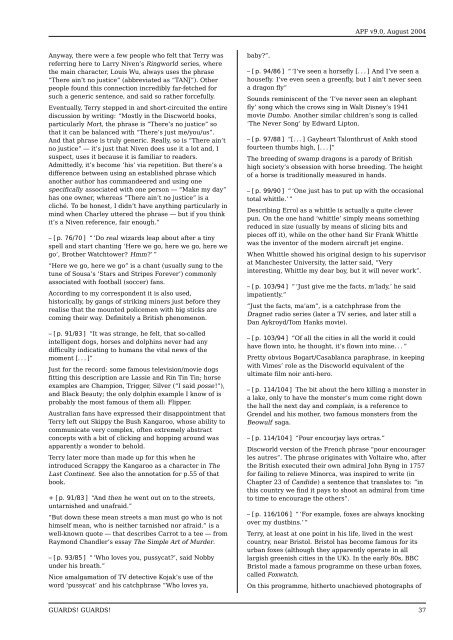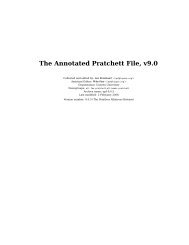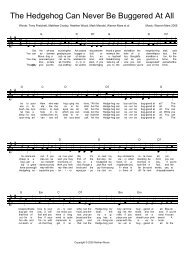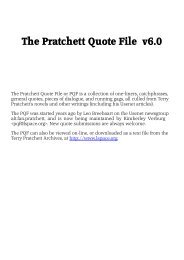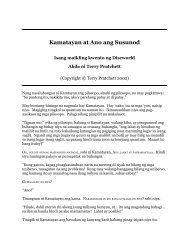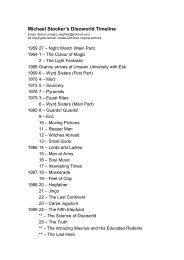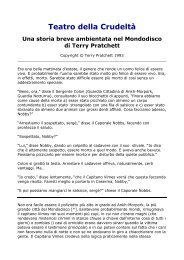The Annotated Pratchett File, v9.0 - The L-Space Web
The Annotated Pratchett File, v9.0 - The L-Space Web
The Annotated Pratchett File, v9.0 - The L-Space Web
You also want an ePaper? Increase the reach of your titles
YUMPU automatically turns print PDFs into web optimized ePapers that Google loves.
APF <strong>v9.0</strong>, August 2004<br />
Anyway, there were a few people who felt that Terry was<br />
referring here to Larry Niven’s Ringworld series, where<br />
the main character, Louis Wu, always uses the phrase<br />
“<strong>The</strong>re ain’t no justice” (abbreviated as “TANJ”). Other<br />
people found this connection incredibly far-fetched for<br />
such a generic sentence, and said so rather forcefully.<br />
Eventually, Terry stepped in and short-circuited the entire<br />
discussion by writing: “Mostly in the Discworld books,<br />
particularly Mort, the phrase is “<strong>The</strong>re’s no justice” so<br />
that it can be balanced with “<strong>The</strong>re’s just me/you/us”.<br />
And that phrase is truly generic. Really, so is “<strong>The</strong>re ain’t<br />
no justice” — it’s just that Niven does use it a lot and, I<br />
suspect, uses it because it is familiar to readers.<br />
Admittedly, it’s become ‘his’ via repetition. But there’s a<br />
difference between using an established phrase which<br />
another author has commandeered and using one<br />
specifically associated with one person — “Make my day”<br />
has one owner, whereas “<strong>The</strong>re ain’t no justice” is a<br />
cliché. To be honest, I didn’t have anything particularly in<br />
mind when Charley uttered the phrase — but if you think<br />
it’s a Niven reference, fair enough.”<br />
– [ p. 76/70 ] “ ‘Do real wizards leap about after a tiny<br />
spell and start chanting ‘Here we go, here we go, here we<br />
go’, Brother Watchtower Hmm’ ”<br />
“Here we go, here we go” is a chant (usually sung to the<br />
tune of Sousa’s ‘Stars and Stripes Forever’) commonly<br />
associated with football (soccer) fans.<br />
According to my correspondent it is also used,<br />
historically, by gangs of striking miners just before they<br />
realise that the mounted policemen with big sticks are<br />
coming their way. Definitely a British phenomenon.<br />
– [ p. 91/83 ] “It was strange, he felt, that so-called<br />
intelligent dogs, horses and dolphins never had any<br />
difficulty indicating to humans the vital news of the<br />
moment [. . . ]”<br />
Just for the record: some famous television/movie dogs<br />
fitting this description are Lassie and Rin Tin Tin; horse<br />
examples are Champion, Trigger, Silver (“I said posse!”),<br />
and Black Beauty; the only dolphin example I know of is<br />
probably the most famous of them all: Flipper.<br />
Australian fans have expressed their disappointment that<br />
Terry left out Skippy the Bush Kangaroo, whose ability to<br />
communicate very complex, often extremely abstract<br />
concepts with a bit of clicking and hopping around was<br />
apparently a wonder to behold.<br />
Terry later more than made up for this when he<br />
introduced Scrappy the Kangaroo as a character in <strong>The</strong><br />
Last Continent. See also the annotation for p.55 of that<br />
book.<br />
+ [ p. 91/83 ] “And then he went out on to the streets,<br />
untarnished and unafraid.”<br />
“But down these mean streets a man must go who is not<br />
himself mean, who is neither tarnished nor afraid.” is a<br />
well-known quote — that describes Carrot to a tee — from<br />
Raymond Chandler’s essay <strong>The</strong> Simple Art of Murder.<br />
– [ p. 93/85 ] “ ‘Who loves you, pussycat’, said Nobby<br />
under his breath.”<br />
Nice amalgamation of TV detective Kojak’s use of the<br />
word ‘pussycat’ and his catchphrase “Who loves ya,<br />
baby”.<br />
– [ p. 94/86 ] “ ‘I’ve seen a horsefly [. . . ] And I’ve seen a<br />
housefly. I’ve even seen a greenfly, but I ain’t never seen<br />
a dragon fly”<br />
Sounds reminiscent of the ‘I’ve never seen an elephant<br />
fly’ song which the crows sing in Walt Disney’s 1941<br />
movie Dumbo. Another similar children’s song is called<br />
‘<strong>The</strong> Never Song’ by Edward Lipton.<br />
– [ p. 97/88 ] “[. . . ] Gayheart Talonthrust of Ankh stood<br />
fourteen thumbs high, [. . . ]”<br />
<strong>The</strong> breeding of swamp dragons is a parody of British<br />
high society’s obsession with horse breeding. <strong>The</strong> height<br />
of a horse is traditionally measured in hands.<br />
– [ p. 99/90 ] “ ‘One just has to put up with the occasional<br />
total whittle.’ ”<br />
Describing Errol as a whittle is actually a quite clever<br />
pun. On the one hand ‘whittle’ simply means something<br />
reduced in size (usually by means of slicing bits and<br />
pieces off it), while on the other hand Sir Frank Whittle<br />
was the inventor of the modern aircraft jet engine.<br />
When Whittle showed his original design to his supervisor<br />
at Manchester University, the latter said, “Very<br />
interesting, Whittle my dear boy, but it will never work”.<br />
– [ p. 103/94 ] “ ‘Just give me the facts, m’lady,’ he said<br />
impatiently.”<br />
“Just the facts, ma’am”, is a catchphrase from the<br />
Dragnet radio series (later a TV series, and later still a<br />
Dan Aykroyd/Tom Hanks movie).<br />
– [ p. 103/94 ] “Of all the cities in all the world it could<br />
have flown into, he thought, it’s flown into mine. . . ”<br />
Pretty obvious Bogart/Casablanca paraphrase, in keeping<br />
with Vimes’ role as the Discworld equivalent of the<br />
ultimate film noir anti-hero.<br />
– [ p. 114/104 ] <strong>The</strong> bit about the hero killing a monster in<br />
a lake, only to have the monster’s mum come right down<br />
the hall the next day and complain, is a reference to<br />
Grendel and his mother, two famous monsters from the<br />
Beowulf saga.<br />
– [ p. 114/104 ] “Pour encourjay lays ortras.”<br />
Discworld version of the French phrase “pour encourager<br />
les autres”. <strong>The</strong> phrase originates with Voltaire who, after<br />
the British executed their own admiral John Byng in 1757<br />
for failing to relieve Minorca, was inspired to write (in<br />
Chapter 23 of Candide) a sentence that translates to: “in<br />
this country we find it pays to shoot an admiral from time<br />
to time to encourage the others”.<br />
– [ p. 116/106 ] “ ‘For example, foxes are always knocking<br />
over my dustbins.’ ”<br />
Terry, at least at one point in his life, lived in the west<br />
country, near Bristol. Bristol has become famous for its<br />
urban foxes (although they apparently operate in all<br />
largish greenish cities in the UK). In the early 80s, BBC<br />
Bristol made a famous programme on these urban foxes,<br />
called Foxwatch.<br />
On this programme, hitherto unachieved photographs of<br />
GUARDS! GUARDS! 37


